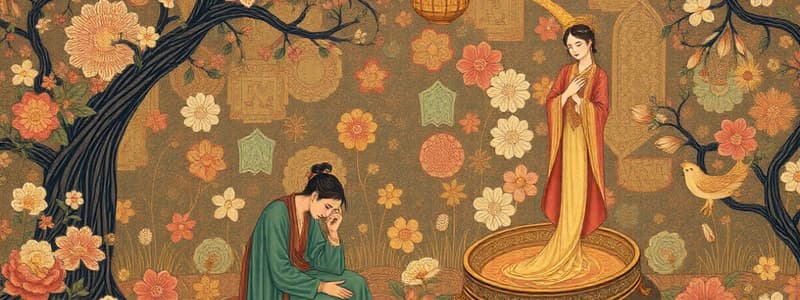Podcast
Questions and Answers
关于文学翻译,以下哪种观点与王佐良的论述相符?
关于文学翻译,以下哪种观点与王佐良的论述相符?
- 各种表达手段之间没有细致差别。
- 风格研究中,最重要的是创作。
- 根据思想情感决定最适合的表达方式。 (correct)
- 应避免比较和选择不同的表达手段。
张元济先生关于翻译的观点强调了什么?
张元济先生关于翻译的观点强调了什么?
- 双语皆娴是翻译的必要条件。 (correct)
- 只有外国学者才能真正理解中国文化。
- 翻译研究应以外国文学为基础。
- 精通外语不如精通华文。
丹尼斯·胡对《围城》英译本的评价是?
丹尼斯·胡对《围城》英译本的评价是?
- 肯定了译本的某些方面,但也指出了不足。 (correct)
- 认为译本完美地传达了原文的风格。
- 认为译本超越了原文的水平。
- 完全否定了译本的价值。
评者在评价方鸿渐家书的英译本时,主要关注什么?
评者在评价方鸿渐家书的英译本时,主要关注什么?
关于凯译和丹译,以下哪种说法更符合原文风格?
关于凯译和丹译,以下哪种说法更符合原文风格?
评论者认为,翻译《围城》这类小说最重要的是?
评论者认为,翻译《围城》这类小说最重要的是?
以下哪一项最能体现“杂交产物——拉长修饰语”的概念?
以下哪一项最能体现“杂交产物——拉长修饰语”的概念?
评论者认为“拉长修饰语”在什么语言中更常见?
评论者认为“拉长修饰语”在什么语言中更常见?
评论者用什么来反驳“拉长修饰语”在规范英文中不存在的观点?
评论者用什么来反驳“拉长修饰语”在规范英文中不存在的观点?
如果将“倒挂眉毛”翻译为“Slanting downward eye-brows”,评论者认为这体现了什么问题?
如果将“倒挂眉毛”翻译为“Slanting downward eye-brows”,评论者认为这体现了什么问题?
根据内容,以下哪一项是翻译《围城》时应该避免的?
根据内容,以下哪一项是翻译《围城》时应该避免的?
根据内容,以下哪项属于翻译过程中“比较和选择”的活动?
根据内容,以下哪项属于翻译过程中“比较和选择”的活动?
在翻译中,译者对原文的“深解”体现在哪里?
在翻译中,译者对原文的“深解”体现在哪里?
评论者批评凯译没有体现方鸿渐家书的什么特点?
评论者批评凯译没有体现方鸿渐家书的什么特点?
以下哪种译文更可能被评论者认为是“杂交产物”?
以下哪种译文更可能被评论者认为是“杂交产物”?
从翻译理论的角度来看,对“信、达、雅”中的“达”理解正确的是?
从翻译理论的角度来看,对“信、达、雅”中的“达”理解正确的是?
根据内容,以下哪一项最能体现翻译的“文化适应”?
根据内容,以下哪一项最能体现翻译的“文化适应”?
翻译中,怎样才能避免译文过于“生硬”?
翻译中,怎样才能避免译文过于“生硬”?
根据文章,以下哪句话概括了翻译批评的意义?
根据文章,以下哪句话概括了翻译批评的意义?
根据内容,对原文的“审美注意”应该放在哪里?
根据内容,对原文的“审美注意”应该放在哪里?
Flashcards
文学翻译的三个维度
文学翻译的三个维度
文学翻译领域内, 理论、批评和创作三者之间缺少能相互融通的研究视角,通过观察、比较和选择,从而决定孰优孰劣孰是孰非。
翻译研究的前提
翻译研究的前提
对于翻译或评论作品的人来说,如果英汉双语都不精通,那么其研究结果必然是错误的和肤浅的。
《评〈围城〉英译本》
《评〈围城〉英译本》
丹尼斯·胡根据珍尼·凯利和茅国权所译的前三章,对《围城》英译本做出的评论
译者/评者对原文的要求
译者/评者对原文的要求
Signup and view all the flashcards
《丹译》
《丹译》
Signup and view all the flashcards
方鸿渐的家信
方鸿渐的家信
Signup and view all the flashcards
翻译要求
翻译要求
Signup and view all the flashcards
Study Notes
- This document is a critical analysis of the English translation of the Chinese novel "围城" (Wei Cheng, meaning "besieged city"), focusing on the nuances of translation and interpretation.
Tone and Style
- The author modestly describes his critique as a limited attempt to understand the profound work of Qian Zhongshu, comparing it to taking a small sip from a vast ocean.
- The author emphasizes the importance of both unique insight and balanced judgment in literary criticism and translation.
- A deep understanding of Chinese is essential to fully grasp the subtleties of foreign languages.
On Style in Translation
- Wang Zuoliang's theory on the study of "style" highlights the importance of comparison and selection in literary creation and translation.
- This involves careful observation of subtle differences between similar expressions and choosing the most suitable one to convey the intended meaning and emotion.
- The author regrets the lack of integrated perspectives among theory, criticism, and creation in literary translation, which would help determine the merits and demerits of different approaches.
- Proficiency in both Chinese and the target language is crucial for meaningful research in translation; otherwise, the results will be superficial.
- Zhang Yuanji's emphasis on the necessity of a deep understanding of Chinese before delving into foreign languages is highlighted.
Critique of Existing Translation
- Dennis Hu's study of "围城" from a linguistic perspective is acknowledged for its positive assessment of the novel.
- However, his 1982 critique of the English translation (by Jeanne Kelly and Nathan K. Mao) is examined, noting both its valuable points and areas where it falls short.
- A translator or critic must thoroughly understand the original work to grasp the author's intentions.
- Without a deep understanding of the original text, a critic may be misled, offering shallow or irrelevant criticism.
Addressing Unclear Issues
- The critic is commended for recognizing the importance of direct experience and proposing revisions to the existing translation (referred to as "Dan's translation").
- A comparison between the two translations is suggested to highlight the differences.
Exaggerated Diction
- A passage from "围城" is analyzed where Fang Hongjian writes a letter to his father in classical Chinese, requesting release from a prearranged marriage.
- The analysis focuses on how the translation captures (or fails to capture) the exaggerated and rhetorical language used in the original.
Analysis of a Specific Passage
- The original Chinese text is provided, followed by the existing English translation, to highlight specific points of comparison.
- The critic argues that the existing translation fails to adequately recreate the exaggerated diction of the original.
- A revised translation is offered, aiming to better capture the nuances of the original Chinese.
Justification for Critical Approach
- The critic defends their approach, emphasizing the importance of preserving the exaggerated tones and rhetorical flourishes of the original classical Chinese.
- The success of achieving this effect in the revised translation is open to interpretation.
Comparative Analysis of Translations
- The comparative analysis focuses on the line "怀抱剧有秋气", comparing "A feeling of 'autumnal melancholy' has suddenly possessed me" vs "In my mind there lingers a strong sense of the autumn of life".
- The author argues while a case could be made for the term "Autumnal melancholy," the meaning is more "a strong sense of the autumn of life".
Disagreement on translation
- The author of this text disagrees that the latter translation is "weaker", arguing it is also suitable
- The author of this text argues the other translation fails to properly capture the effect, and replaces this translation with "Each time I look in the mirror I see myself spiritually weak and physically emaciated.", highlighting the verbose nature of the text.
On the Author's Note
- A statement on translation from Lin Yutang is cited that emphasizes between the differences between writing for different groups, supporting the idea that some differences need to be had.
- The passage from Lin Yutang states: Ordinary english language, but only shallow variations of writing, there is no certain boundary between white and white, nor is there a complete consistent writing matter.
Hybrid Character - Lengthening Modifiers
- The document references further translation problems.
On the Translation's Hybrid Character
- The critic notes the language of the work conveys a heavy sense of Chineseness and a use of lengthening modifiers.
- The author then states by just copying terms to the page in english, it makes for a frightening product.
- The use of this type of work is very common in chinese, but not in english.
- The critic provides this with five examples.
Examples
The five examples of instances that are of trouble are provided:
- Slanting downward eyebrows Removing her sunglasses, she had disclosed big slanted dark eyes, gleaming with bold intelligence
- A small gray-headed Italian woman passed the food.
- The early Roman spring had filled the air with the bloom and perfume. Humboldt, that grand erratic handsome person with his wide blond face, that charming fluent deeply worried man to whom I was so attached, passionately lived out the theme of success.
- Big fair wan lovely-pale-freckled Kathleen with that buoyant bust gave kindly smiles but mostly she was silent.
- We met Sewell for lunch - a muttering subtle drunken backward-leaning hollow-faced man.
- A sensitive, susceptible, exaggerative, earnest man
Studying That Suits You
Use AI to generate personalized quizzes and flashcards to suit your learning preferences.




